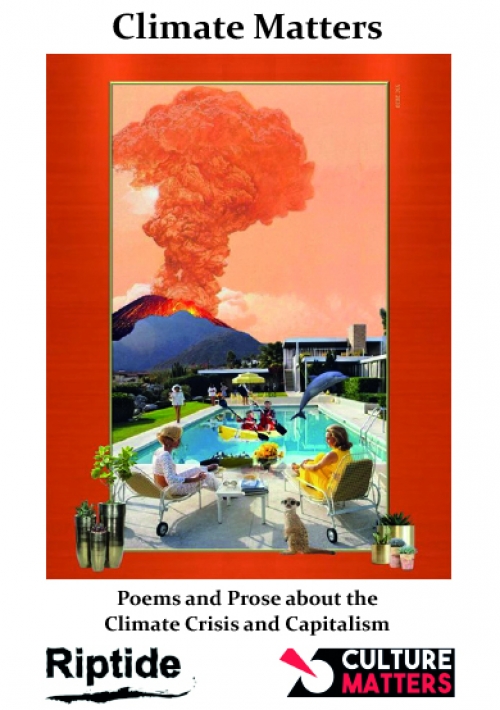Climate Matters

Sally Flint, Virginia Baily and Mike Quille have edited a new anthology of various kinds of writing on the subject of the climate crisis and capitalism. It is free and downloadable below
In 2019 we challenged writers and artists to address the burning topic of the climate crisis and question its relationship with capitalism. In 2020 Covid–19 erupted and spread across the world.
The whole of this anthology has been assembled under the ongoing but ever-changing restrictions imposed by this pandemic, which has necessarily coloured the content in ways that we could not have foreseen when we put out the call for submissions.
Amongst other effects, the Covid lockdown made our world pause; it let the Earth breathe – albeit for a short time. It made us search for words that imagined a brighter, cleaner, greener future. At the same time it let climate concerns slip down the agenda, and in our sudden need for PPEs and facemasks made us forget our unkept promises about single use plastic. Ultimately though, its advent and its non-respect for borders, remind us of how we are all interconnected. The Coronavirus also inspired writers to show how health and wellbeing relate to eco-systems and the climate crisis. It was a logical step to link Climate Matters with the ‘Waking up to the plantetary health emergency’ conference at the University of Exeter and to have the publication of the anthology coincide with the start of this.
If the descent to extinction is ‘not a slippery slope, but a series of cliff edges, hitting different places at different times,’ as Alex Pigot of University College London, said in his study into the loss of biodiversity, (Nature, April 2020), then the pieces in this rich and varied collection can be said to fall into four main categories: the edge of the cliff; over the edge; the ledge on the cliff-face; stepping back from the edge.
The majority of the pieces fit into the first category. They constitute an attempt to articulate the status quo, to do that difficult thing of lifting the blinkers from our eyes and staring clear-sightedly at what is revealed about the state of our planet and its causes. They seek to counter the massive, wilful blind spot so arrestingly conjured in Bob Beagrie’s ‘Last Supper’ where the demented god in whose image we constantly re-fashion ourselves has ‘plucked out his own eyes so he shall not see our plight.’
This is the first hurdle, and it is difficult to surmount both because what clear vision affords us is terrifying and because we are in and of the system, the children of global capitalism, and not geared to view dispassionately the thing to which we belong.
Some writers shared a vision of going over the edge and explored various dystopian and / or post-apocalyptic futures in the brief last outbreath of humanity but, along the way there, breaking the fall, we came across a sort of ledge – the third category – where a seeming solution to some aspect of the crisis might give temporary respite and a sense that things might not really be as bad as we thought. For example, that technology will step in and save the day.
Few of the contributions in the collection come into the ‘stepping back from the edge’ category and no author claims to have the solution (unfortunately). Instead they offer a tentative hope that humankind will dare to change. As poet and Met Office scientist Natalie Garrett puts it: ‘We have got/ just one shot / Together we raise the bow /And hold our breath.’
The collection makes for sobering reading, but it is also beautiful, insightful, occasionally uplifting and leavened with humour, mainly of the gallows kind. And it is also necessary, because the first step to action is to seek the truth, not to flinch or seek token responses, not to close our eyes and turn away, not to shrug or be side-lined by despair or eco-terror, or the magnitude of the vested interests, including our own, at stake.
Greta Thunberg was right to excoriate the rich and powerful gathered at Davos earlier this year, for having done ‘basically nothing’ about the issue. But as we have seen throughout the pandemic, an economy geared to the maximisation of profits, and a state shaped to facilitate that goal, means that our society is poorly equipped to plan for an emergency at all, whether that be a health emergency or a climate emergency. Climate change and the coronavirus are hitting the poorest hardest, and capitalism is making things worse.
Climate Matters is a powerful expression of the inextricable connections between capitalism, Covid–19 and the climate crisis, and the need for a new, democratic and socialist vision of how we see our world and our place in it – a new definition of what constitutes a good life.
Through words, metaphors, images and scientific argument, this collection brings to life the nature of the cliff edge on which we teeter. It is the clamour of clear, resounding voices calling from that cliff top, saying that we need to act now and act fast, because our survival depends on it.
Download attachments:
- Climate Matters.pdf (1209 Downloads)

Sally Flint
Sally Flint lectures in creative writing and co-edits Riptide Journal at the University of Exeter, and is a tutor with The Poetry School.
